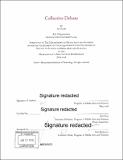Collective debate
Author(s)
Yuan, An,S.M.Massachusetts Institute of Technology.
Download1126790108-MIT.pdf (14.05Mb)
Other Contributors
Program in Media Arts and Sciences (Massachusetts Institute of Technology)
Advisor
Deb Roy.
Terms of use
Metadata
Show full item recordAbstract
Participating in online debate can expose people to diverse viewpoints, and thereby reduce polarization of opinion over controversial issues. However a lot of online debate is hostile and further dividing -we need tools that facilitate meaningful back and forth discussion. For my thesis work I created such a tool in the form of an artificial agent that engages users in debate over controversial issues. By engaging in debates with many users, the agent will start to gain insight into things like: what kinds of arguments do people find persuasive? Or, what can we predict about a person's argumentative behavior from their moral sense? Or, what is the characteristic debate path for someone who becomes persuaded to change his mind completely? The agent will then use what it has learned to help users on either side of an issue better understand each other by exposing them to compelling arguments from both sides. To identify these arguments, the agent develops a model of the user that predicts which arguments the user will like. I measure the agent's performance given different models of the user. I then evaluate the performance of each model against the random agent, which does not attempt to model the user.
Description
Thesis: S.M., Massachusetts Institute of Technology, School of Architecture and Planning, Program in Media Arts and Sciences, 2018 Cataloged from PDF version of thesis. Includes bibliographical references (pages 101-102).
Date issued
2018Department
Program in Media Arts and Sciences (Massachusetts Institute of Technology)Publisher
Massachusetts Institute of Technology
Keywords
Program in Media Arts and Sciences